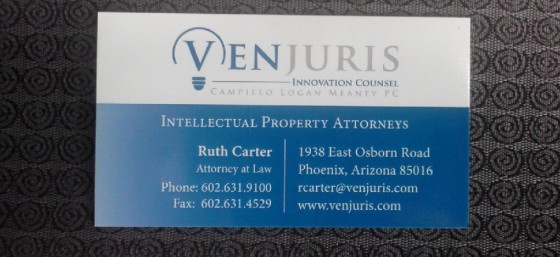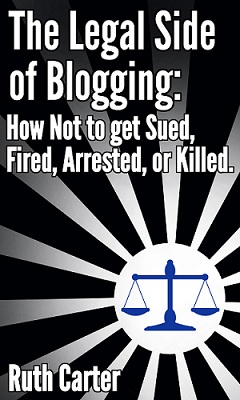
A few months ago I made the important decision to join a law firm in Phoenix called Venjuris. The firm used to be Venable Campillo Logan and Meaney but they recently rebranded. I’m excited to combine forces with them. I’ve been getting settled in to my new office during the last two weeks and getting hooked into their computer file and billing system. I’ll be seeing clients again starting next week. Check out my new bio – I’m blonde!
Will the Type of Work I Do Change?
Not really. I will continue to work on copyright and trademark matters; website terms of service; business formations; contract negotiation, drafting, and review; and offer consultations for clients who need help with related to business, intellectual property, social media, and flash mob law issues.
What do my New Colleagues Do?
Venjuris is mostly an intellectual property firm. They do patents, copyrights, trademarks, and licensing. We also have an attorney who does intellectual property litigation. They also do a lot of international intellectual property work. They’re all awesome people. (I wouldn’t have joined the firm if they weren’t.)
What will happen to Carter Law Firm?
Nothing! I will continue to do professional speaking and writing under Carter Law Firm, but all new client matters will be handled under Venjuris. I’ll continue to write blog posts and make videos for Carter Law Firm on at least a weekly basis and I’m putting more energy into public speaking. I have gigs lined up for San Francisco, Las Vegas, and London in the first half of this year and, of course, I’m doing The Undeniable Tour starting in March.
I will be revamping this website to shift the focus to speaking, writing, blogging, and vlogging during the next few weeks (maybe months). But in terms of what I do and how I do it, not much will change.
Where’s my New Office?
1938 East Osborn Road, Phoenix, AZ 85016
Will Rosie Still Come to Work with Me?
Yes. For now, she’s allowed in the office one day a week. Hopefully my colleagues will see that she’s not a distraction and actually helps me work better and will let her come more often.
Want to See my New Office? I made a Video!
How can you Contact Me?
If you’re interested in hiring me for legal work, contact me at rcarter@venjuris.com.
If you’re interested in hiring me to write an article or post for you or speak at your event, contact me at ruth@carterlawaz.com.
Email is usually the fastest way to reach me.
Of course, you can always connect with me on Twitter, Facebook, and LinkedIn.










